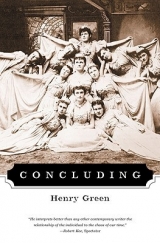
Текст книги "Concluding"
Автор книги: Henry Green
Жанр:
Современная проза
сообщить о нарушении
Текущая страница: 7 (всего у книги 14 страниц)
She started to write her name on window glass with a forefinger that left no trace, making the trapped bluebottles buzz.
"Dear," she said sadly, "you don't love me, you can't." He got up at once, came to her side. But she turned from him. He stood helpless.
"You can't," she repeated, in a wail.
"We weren't talking about ourselves," he pointed out.
"He is me," she said.
"Then listen to this, Liz please, I beg."
She moved off to the door, watched the copper in its shed. Because she had not walked out right away he felt it was safe to continue, yet was so nervous he fell back on the voice of the sort of lecturer he was not, and which he did not often use when with her.
"Consider for a moment our whole position here," he said. "A complete community related in itself, its output being what is, of course, the unlimited demand for State Servants, fed by an inexhaustible supply of keen young girls. Staffed, as well, by men and women who are only too well aware they can be replaced almost at a stroke of the pen by the State, from which there is virtually no appeal. In fact, we have here a sad bevy of teachers lying wide open to be reinvigorated, as it would be called, by new blood of which, worse luck, there is only too plentiful a supply in the Pool."
Still with her back towards him she laughed.
"Darling, you do do it well," she said. He thought, anyway she seems to listen, and was encouraged to pursue the matter.
"It follows," he proceeded, "that for the present an equipoise can be claimed here. There are, naturally, individual tensions, what one might describe as instances of disintegration or even of centrifugal action, whereby certain appear, now and again, to be flung out into the periphery of outer darkness. In other words we do not always agree between ourselves. Nevertheless I claim that we have a general measure of contentment in spite of what are, no doubt, inherited differences of outlook. To sum up, we exist together to earn a living by teaching others how to gain theirs. By and large we go about it in peace, and so I claim that there is what I can call a condition, which is to say a self compensating mechanism, in, or of, equipoise."
He paused. He was about to lose the thread. She said no word.
"But an incautious movement towards the centre," he went on with an effort, "towards the shaft upon which our little world revolves, that is to say upon the State which employs us at our main function, that of spinning like tops on our own axis," and here he gave one of his cracked laughs to point the jest, "can only fracture the spinning golden bowl, the whole unit, and bring the lot to nought, in other words, reduce us to the lowest, the unemployable."
"What is it, dear?"
"He's worried about this cottage, Liz," Sebastian replied promptly, but in his own voice.
"If he's worried, then he only is about me. I do blame myself," she said.
"Oh no, he's not," he said. Then Birt lost control. "He's past the age," he rushed on. "Besides he's ending, dying on his feet, I tell you. More than ever capable of some incredible folly."
"Don't be absurd, please," she said, and walked out in the sun in a sweat, as if she had been dowsed with cold water. He followed.
"Why, you don't mean he could have been upstairs all the time?" he whispered.
"There you are," she said, then turned on him in the sharp light. "You're terrified of Gapa, you all are, every one of you, and quite right. He'll do what he thinks fit, so he should. They've been at you about our house, though I don't know exactly how or what, and I don't want, I wouldn't stoop so low."
"Justice," Sebastian began almost to shout. "Old men have no idea at their age. They're too old."
"But darling I'm sure I didn't say a word, even, about justice."
"Yes Liz, but that's the essence of what we're discussing, surely. He's got his teeth into some injustice he thinks they've done this student, he will talk too much with the children you understand, and he's out to make trouble. But the bad part is, don't you see, he'll do it in spite of our cottage."
"It's me he wants to protect, it's me he loves," she said, showing signs of great agitation which he was too excited to notice.
"Yes, yes, he is, and that's why, and. ." he answered in a jumble, but she burst into tears and hurled herself at him. She forced herself on his chest as he stood there, arms hard around his neck.
"Oh Seb darling, why do you frighten me so?" He clutched her, speechless.
"If you love me like you say you do?" she went on. He held her tight, as though to crush the fears out.
"Forget it," he said. "This girl's disappearance has bowled me over."
She relaxed a trifle in his arms.
"But you said yourself Gapa was too old, and had to be let do what he wanted."
He stiffened.
"Why, you don't mean he really has anything on with this Mary?" he asked.
"Of course not," she said. "You must be mad. At his age? Really."
"It's all very well, Liz," he said, and relaxed his hold. "They do, you know." Then he put on the lecturer's voice again. "There have been regrettable instances," he intoned. "We have only to recollect the Police Court cases in the old regime."
"Stop that, Seb. I won't have you go on like it about Gapa. He's worth the whole lot of them." But she gave him a Judas kiss on the mouth.
"I love you," he mumbled, against lips which were thin as grass. He drew back. "No," he said, "Baker's all right. It's Edge is the trouble."
"They have no men," she said of these spinsters.
He winced. He even squirmed. But she did not notice.
"Baker can, and will, listen to reason, but the guv'nor's a real terror," he brought out at last. He took her hand. They wandered over to the sty. "She'll stop at nothing. She'd a light in her eye at lunch which made me uneasy, I can tell you. And to say what she did into the bargain."
"All right then, what did she say?" Miss Rock asked in a tired, bored voice.
"Oh not in so many words," he answered. "But it would do no harm at all to watch most conscientiously. She'll fight."
"What about?"
"To win her own way, of course. D'you suppose he could ever be persuaded to accept this election if it comes?"
"So that you can take over the cottage?" she asked with extraordinary perspicacity in a small, languid voice, while she glanced at him.
"Hullo, what's this?" he said, halted in his tracks.
"You're not being open with me," she said, and did not meet his eyes.
He knew this was so, but could hardly admit it. He had also to bear in mind that she must be spared shocks.
"I am," he protested. "Darling, we've not kept things from each other, have we?"
"You must remember Gapa's everything, Seb."
"Everything, Liz?"
"Well, after all he's done, when he's worked his fingers to the bone, and his discoveries from the time he was young, I do think he's entitled to lead his own life from now, I mean we owe it to him, don't we, and if you loved me, darling, you'd see it that way too. I mean if he's good enough for the State, for them to let him and melive on here, then I don't see we've a right to tell him whatever it is might suit us at the moment."
"But darling, they will offer the election. The State will."
"Who said they would?"
"Miss Edge heard, Liz. When she was up in Town. This morning."
"You don't mean to say you've talked over Gapa again with that woman?"
"Of course not, dear. She just mentioned it at lunch."
"So that's what you've been at, then?" He stayed miserably silent.
"Don't let's mention them even, any more," she said, as though she had made up her mind this was all a stupid misunderstanding. She kissed his cheek. "Shall we go down to the Lake?" she said.
"Oh, not there, Liz, I'd want to bathe," he extemporised." They've put out an order against that on account of the weeds."
"All right, where? The beech tree?"
"Back to our private beech, Liz?" he agreed, nervously. She kissed him twice.
"Dear me," she said, very shy all of a sudden. "You have become loving." And they made off, hand in hand once more.
* * *
The staff, as well as the students, were allowed half an hour in which to be down for tea today, nevertheless it was unprecedented for Miss Edge to be the ten minutes late she was, and still more so for her to be faced with the fact that many of her colleagues could be even more unpunctual than herself. There was no sign of Marchbanks, which was, perhaps, to be expected after the ridiculous misunderstanding that had been uncovered about not calling the doctor, but Miss Baker was absent, and, most significant of all, Sebastian Birt had not put in an appearance, which was inexcusable after what had occurred, and, for that matter, was still going on, perhaps. Because they still had no news of Mary.
Edge literally itched to get to grips with Merode in spite of the rules and regulations, but now Dr Bodle had seen her at last, he'd forbidden even the simplest questioning, an injunction which Miss Edge would have been inclined to ignore, or forget, only Baker rather lost her head, had grown quite insistent. The thought of a girl laid by in full possession of her faculties, with a key to the whole mystery, protected even from points her own mother should put by the too hasty opinion of this fool of a medico, angered Miss Edge so much, now she had drunk some tea and felt restored, enraged her so deeply that, from the dais, she turned another terrible look on her charges, and several were caught in the middle of huge yawns; the soft, brilliant wetness of their pink mouths, and shining pearly teeth, being struck at her glance to pure enchantment, under wide, astonished eyes.
"Can Dakers and I help with the flowers afterwards, ma'am?" Winstanley asked.
"Thank you. I really feel I can manage," Miss Edge answered. She glared around. There was one good thing, she told herself, the girls were no longer at their whispers, there were none of those stares as at luncheon. But, on the other hand, the atmosphere was lax. They sat over tea as if washed out.
Next she examined her pile of blooms. Was it imagination, or had these in some way settled? But surely not by their own weight?
How absurd that, at lunch, she had had this feeling the child was underneath.
And certainly the flowers – were fading.
She took another glance at the students. No, they showed small interest in High Table. They entered by dribs and drabs, lazily, slack. Miss Edge clenched her thin fists.
She sent a frightful look at the gigantic, repeating gramophone, dumb in a corner.
"Has it been overhauled?" she asked at large.
"What is that, ma'am?" Winstanley questioned.
"Why, the music for our Ball of course," Edge replied. "We do not want to be suspended, so to speak, by a breakdown."
"Oh, the old thing's in a good mood now, ma'am. We tried the records as late as Tuesday."
"A mood, Winstanley? Will you arrange for the car to go at once over to Bradhampton to pick up Edwards, that is his name, Edwards? Then he can give the mechanism a thorough doing."
"Your car, ma'am?" Winstanley said. "But Miss Baker's taken that."
Edge felt her heart lurch. Hermione take the car and not say a word? What was this?
"Dear, dear, where is my memory?" she lied. "The truth is I have so much before each of these Festivities I sometimes wonder how I shall get through. Then you might send word, and he can come up on his bicycle." Like the policeman, she thought. But Baker must have something up her sleeve which could only have to do with Mary. How disloyal not to have mentioned it.
Miss Edge once more began to feel nervous.
She looked about the great room. By good fortune none of the girls seemed to watch the pile of blooms.
"Did she say when she would be back, then?" she asked.
"Miss Baker, ma'am? She's upstairs, resting."
"I distinctly understood her to tell me she had to run over somewhere," Edge lied again, to save her face. But she let all the anguish she felt sound in the voice she used.
At this precise moment one of the orderlies brought her Principal the post. A letter, marked O.M.S. in great black capitals, was addressed to her personally, and she opened it at once.
"Dear Miss Edge,"she read, " I am directed by Majesty's Secretary of State Swaythling to inform you of the following, reached by the Secretary's State Council as conclusions, and with which he is in agreement. He intends to implement these conclusions by means of a Directive to be issued as soon as possible.
(1) That, generally speaking, there is insufficient opportunity at present for those girls under tuition for State Service, throughout the various Institutes, to take part in practical management.
(2) That, for this purpose, it is advisable they should be provided with pigfarms.
(3) Under the supervision of their Principals, students should run such an undertaking themselves, cooperatively, but in strict conformity with all Directives as may from time to time be issued by Majesty's Minister of Agriculture to professional pig farmers.
Finally: It is anticipated by these means that students will avail themselves of the opportunity afforded to learn from practical experience the day to day problems which arise in Administration.
Bearing in mind the need for stringent economy which obtains at present, your suggestions as to how this scheme can best be set in motion, together with those of your colleague, who should have received a similar communication by the same post, can be addressed to me, so that I have these on my desk not later than today week. Your fellow worker. John Inglethwaite"
Miss Edge was quite pale when she had finished.
One of the juniors seated below the dais said, to make conversation with an older girl, "Gosh, will you just look at Edge now, again."
"She's not so bad," the senior tolerantly answered. "It's your first summer here, I suppose? She's always a trifle nervy before the dance. But she'll be very different once we're under way."
Edge folded the communication from Inglethwaite and laid this on the table. She pressed the flat of a thin, open hand down over it. She was breathing heavily. Pigsties all over the wonderful Place? And the Stench? There were times, indeed, when one's ultimate loyalties were tested.
Not a scrap of help could be expected from Baker, who would find the whole idea quite practical; no, Miss Edge decided, no, her colleague would just remark. . 'how quaint, how black and white.'
She looked with anguish about the great room in which they were to dance. It had been The Banqueting Hall, burned down in Edwardian times. When the owner rebuilt he had replaced a vaulted roof of stone by oak, and put flat oak panelling eight foot up the walls, all of which, including a vast bow window over the Terraces, had been varnished a hot fox red, then, at some later date, treated with lime, until the wood turned to its present colour, the head of a ginger-haired woman who was going white as her worries caught up, in the way these will.
But Miss Edge's glance, now, was seeking the familiar, she sought comfort in what she had known so long, there was a long appeal about her look.
"Oh, we must give them a good Time," she said aloud. "It shall be a real Success."
A younger girl turned under this gaze to another, and whispered, "I bet Edge is a bit inside out to do with Mary."
"Why, whatever for?"
"Haven't you heard? There was a telegram to say the sister Doll was badly ill at home, and she was to go at once. Muriel had it from one of the seniors, who was there when this wire came. Rotten luck, on the night of the dance."
Her friend said, "I thought I hadn't seen Mary today," and went on to speak of the time she'd had to wait before she had been able to iron her dress.
An evening air, entering cool by wide windows, wafted the scent of that pyre of flowers to Miss Edge, reminded the lady that she had not yet had her stroll, that there could be no leisure for that now, with all she knew she had still to do. At the same time it carried a small buzz to her sharp ears. She at once looked more closely at the azalea and rhododendron. With a great rush of horror, she realised the whole pile of blooms was alive with bluebottles.
For a moment she thought she might faint.
She looked again. She forced herself to admit that, at first glance, she had exaggerated. There were not as many as she had thought. Yet the scent was distinctive, sickly. So what did this new frightful-ness portend? And how could they ever dispose, now, of this huge mass of blooms? While the whole idea, that there must be the body underneath, was unhealthy, morbid, too absurd, would she have to face it, after the girls had made these flowers into great swags of fragrant colour at her direction on the walls, would it be that buzzing flies might stay round the bouquets, turn all to decay and desecration?
Her mouth and throat burned dry. Try as she might, she could not swallow. She picked up the cup of tea with hands atremble, but before she could bring it to her lips, she retched.
She supposed there was no-one who had not noticed. She looked about, clinking the cup down. And not a soul seemed to have seen.
How idiotic to start an illness at this juncture, when she would get small help from Baker, goodness knows, and with the Dance upon them. But she swore she must protect her Girls; they should never know. It was Founder's Day. Everything must proceed, and in due order.
At this moment she saw their little red State tourer come up the drive past these Banqueting Hall windows, attended by its cloud of dust. A middle-aged woman, on whom Miss Edge had not set eyes in her life, sat alone in the back. The worst was, if this should turn out to be some new plan of Baker's, she could not ask who in the world might the creature be. Then Edge wondered whether Mr Rock had a younger sister, or perhaps it was even Elizabeth's mysterious aunt. She watched the staff, but they seemed to pay small heed. Mr Dakers entered.
"You are not last," Edge said, at her most gracious, in an allusion to Marchbanks and Sebastian, the intense curiosity making her feel livelier already.
"My apologies, ma'am," the man replied. "I do not know how it can have happened."
"You need not insist," she assured him. "Founder's Day is one occasion in the year when we may all relax. Until evening, that is, when the real business of our holiday commences, with music, with the first waltz." She smiled in a friendly manner. And the smile stayed frozen on her face as Marion entered from the direction of the Sanctum. The child had been in tears again. She bent to Edge's ear.
"Miss Baker says, ma'am," she whispered. "Can you spare a minute. Mrs Manley's just arrived."
Manley, Edge asked herself as she rose, Manley? Why Merode of course. Merode Manley. Oh, what devilry was this?
When Edge came in Baker was pouring a cup of tea for the woman. She remarked, "Dear, this is Mrs Manley, Merode s aunt."
"How d'you do, Mrs Manley," Edge said, while she took her hand, "I'm sorry we've had to bring you all this way," she added, so as not to admit ignorance of her colleague's intentions.
"How d'you do," the woman replied. "But I still don't quite understand," she said to Miss Baker.
"I was just explaining to Merode's aunt the predicament in which we find ourselves," Baker suggested diplomatically, because it was quite on the cards this woman might give trouble. She had the air of a determined creature. "There is nothing the matter with Merode," the Principal went on. "On the contrary, we've always found her so helpful, haven't we dear? But I must say, in the present circumstances, we hardly know what to decide."
"It is Miss Baker, isn't it?" Mrs Manley addressed Edge's colleague. "Then I'd be so grateful if you could tell me what this is all about. You say she is quite well?"
"Yes, Mrs Manley, I'm glad to assure you the doctor's given a clean bill. But the truth of the matter is, she was out most of last night."
"Who with?" Mrs Manley asked sharp.
"Another student," Edge replied, as quick.
"A girl?" Mrs Manley enquired, turning what Miss Edge decided was a hostile look upon her.
"We have no male students here," Edge spoke out severely, so much as to suggest that a joke in bad taste had been cracked.
"And the other girl is not home yet," Miss Baker explained.
"Yes, I see," Mrs Manley said, not in the least apologetic.
"So we were wondering if you could help," Edge announced, as though her colleague and herself had hatched a curious plot.
"I wonder if I could see Merode?" the woman asked, but in a hard voice.
"I think that would be best," Miss Edge agreed.
"But, dear, the doctor," Baker objected. "He said she was on no account to be pressed. And we have our regulations."
"Surely the child's own aunt. .?" Mrs Manley asked.
"She was in pyjamas," Edge interrupted, as if this explained all.
"Well of course, since it was at night," the strange woman said.
"Do have another of these cakes. We rather pride ourselves on them," Miss Baker offered, and it occurred to Edge that, everything considered, this particular aunt and guardian was having a fine tea. Did they have nothing at home, for them to eat so enormously whenever they came over? Was it fair to the girls in the holidays?
"Thank you," Mrs Manley accepted. "No," she went on, "had you said Merode wore her day things, then I would have been worried."
"She has torn the leg," Miss Edge pointed out.
"But you told me she was not hurt."
"The trouser leg," Edge patiently explained.
"On a briar, because it was dark, no doubt," the guardian answered, and again showed relief in her tone of voice.
"Oh, it had occurred to us this thing might have been worse," Miss Edge commented, at her most dry. Baker gave a glance of warning.
"We wondered if we could put our heads together," she said in a conciliatory way.
"I'd like a word with the child first," her aunt insisted.
"Of course," Miss Baker said. "The only trouble is the doctor. ." and she did not finish her sentence.
"You surely did not get me over to forbid my seeing my Merode," Mrs Manley objected, and appeared to harden.
"There are also our regulations," Baker pointed out, in embarrassment.
The relative snorted.
"All the more reason, then," she said, starting to get her gloves and bag together.
"I think what my colleague tried to explain, without having to cross the i's and dot the t's, is this," Miss Edge announced. "You cannot, of course, be familiar with the Directives under which we carry on our work here. They are designed to protect us, as well as the students, from day to day inconveniences that may arise where a community of young people exists."
"But you are not going to tell me this happens commonly, Miss Edge."
"In the ten years we have been here, I do not know when we have had someone over at such short notice," the lady answered, then waited. When there was no retort, and she had given Baker a look to express her disagreement at the summoning of what had turned out to be a recalcitrant witness, Miss Edge continued, "We are fronted by an entire scaffolding of Reports. In certain circumstances we are obliged to render a Report of behaviour to our Superior Authority. And, if we are to do so, the most stringent Rules obtain. Access to the party concerned before she has given an explanation is rigidly excluded. I cannot see her, my colleague even cannot do so, no-one can intervene before she has given her own story."
"Then why have me over?"
"We thought it the human thing," Baker interjected, miserably.
"But what's behind this, what has she done?" Mrs Manley complained.
"There's a man in it, I'm very much afraid," Baker muttered.
"No really Miss Edge. ." the aunt began.
"Miss Baker," Edge corrected, as if to dissociate herself from the line which was being taken.
"… I can't accept that," Mrs Manley went on, with a look of venom at Edge. "Only sixteen, and not ever a hint of the kind at home."
"We sometimes notice with families. . where the parents are no longer together. ." Baker uttered in a faint voice, mixing Mary with Merode.
"Their orphans wander about the garden at night in pyjamas?" Mrs Manley asked, and actually laughed aloud.
"Miss Baker has written the standard work on this difficult subject," Edge said, thrown back on the defensive.
"Well I don't know that my husband wouldn't agree with her," the woman announced in what could only be termed a fruity voice. "But you and I realise it's hardly usual, don't we?" she had the impudence to ask Edge.
"I am afraid we shall not see eye to eye," this lady said, while Baker made a gesture of weariness.
"There's a whole history of such cases," she explained "I've no doubt," Mrs Manley agreed, conscious perhaps that she had gone too far. "And of course I'm grateful to you for the chance to put our heads together," she added with what was, to Edge, an altogether offensive familiarity. "But I have the right to see my ward at any time, I hope?"
"Of course," Miss Baker said.
"Yes," Edge put in. "The question is, how not to make it harder for her."
"In view of your rules about reports, you mean?" the aunt enquired.
"Just so."
"Oh well, Miss Edge, I hope it won't come to that, indeed not," Mrs Manley answered, in such a way that the lady felt this relative was in full command. Then the aunt tried a shot in the dark. "But I do feel I have a right to learn how it was you came to the conclusion there might be a boy in it, before I go up to see my niece," she said.
"She told Miss Marchbanks," Baker explained, quite unaware.
"Exactly," Mrs Manley said. "But did she write out an account?"
"Oh no," Baker replied, with signs of distress because she saw looming ahead the awkwardness that Merode had fainted. But Edge could see further. She was on tenterhooks.
"Then this Marchbanks person questioned her?"
"Yes, and such a distressing thing occurred," Baker hurried on, regardless. "The dear child fainted."
"Fainted?" Mrs Manley echoed, in a voice of horror. It was then that Baker saw the pit she had dug for herself.
"Oh, not what you think at all," she said pettishly. "It was what made the doctor diagnose shock."
"Third degree shock," Mrs Manley snorted. Edge had to keep herself from clicking her fingers together she was so exasperated.
"Really, madam, I cannot have this," Baker said, with great firmness, rising to the occasion. "I asked you here to have a quiet talk about what was best in the child's own interest, and you make suggestions as to our competence. Perhaps I should remind you that the State, when It delegated Responsibility to my colleague and myself, gave us a large measure of protection, or latitude if you prefer the word. I asked you over because I felt that was the human thing to do. If you insist you must see your niece before she has voluntarily made her explanation, then my Report shall go in and I'll note the fact in what I have to write, which may go hard with her. After all, I can lay claim to some experience."
"There is one of our students missing yet," Edge added, white of face.
"But what d'you get out of your girls if you won't allow anyone to go near 'em?" Mrs Manley asked, in a humble voice. Baker, at this point, was misled.
"My dear Mrs Manley," she said, back at once to her most expansive. "We are not like that with our children. There is perfect confidence."
"And if they won't talk?"
"Well then, that is very difficult, isn't it?"
"But Miss Baker, who is this Marchbanks?"
"Our deputy. Weboth have to go to London Wednesdays, and while we are away she takes our place. We have complete faith in her, isn't that so, Edge?"
"Of course," Miss Edge agreed, showing in her voice the disapproval she felt at the line their little talk was still taking.
"And, in spite of the rule you have about interviews with your students, she was brought before Miss Marchbanks?"
"She was found hidden," Edge interrupted, finally taking charge.
"Then who hid her?"
Miss Edge answered with a prolonged shrug of the shoulders.
"That's one point on which I'd like to see Merode, of course," Mrs Manley said. "But this woman interviewed the child?"
"Certainly not," Edge objected. "When Merode was discovered she was brought before our deputy, as she would have been before us if we had not been obliged to be elsewhere."
"She was asked no questions?"
"Miss Marchbanks has thirty years in the State Service. I am confident she would never betray her Trust."
"But excuse me, Miss Edge, you haven't answered my question."
"I have some regard for accuracy, madam. Since neither myself or my colleague were present. ."
"And yet my little girl fainted?"
"She blurted something out about a man and then she fainted," Edge agreed.
"You see, it is just this point that I find so difficult to understand," Mrs Manley appealed to Baker. "What man? Where is he? If she volunteered what she did, why don't I know about him? And in her pyjamas, too."
"But my dear lady, it is precisely why we asked you to come over. Merode has been simply splendid the whole time she has been here. We just wondered if she had given any indication in her letters?"
"There is one of our girls we cannot account for yet," Edge repeated, in a warning voice.
"But I've had not a hint from the child," the aunt protested. "She's always been so very happy with you both. Of course, I don't say she has no secrets from me. I know I never told my mother a word, and I don't expect any different from my poor sister's girl." Edge sniffed audibly, but was not noticed. "Yet I'm sure, if she'd fallen under the influence of an older child, then I'd have had at least an idea."
"And there's been no sign?" Baker asked, hoping against hope.
"Not one," Mrs Manley answered. "But I'll tell you a perfectly simple explanation of the whole affair."
"By all means," Baker encouraged, dubious to the last.
"Sleepwalking," the aunt announced, in barely concealed triumph. And Miss Baker was so flabbergasted at this forgotten echo of the dawn that, without more ado, she took the woman up to Merode at once.
Edge did not stay to argue. There was no time, she felt. As soon as Baker had led the woman out, she herself hurried off to get the decorations done because, now they had decided to hold their Ball, it must be the most successful ever. The girls simply must enjoy themselves.








